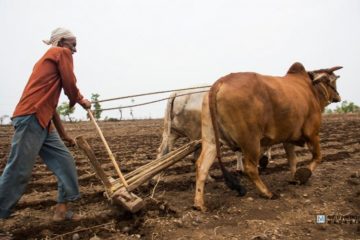Written by : Pooja Sharma
Photo credit : Shutterstock.com
India had travelled a long way before we finally achieved independence. British had conquered India following the Battle of Plassey in 1757. The East India Company then ruled a more substantial part of India. The East India company invaded India and made it a colony with the aim of profit-making and exploitation. The approach adopted by the British to rule India was ruthless and unregulated. However, the British India company got dissolved in 1874. The power went from company to Crown. Even though the Crown was based on utilitarian principles, it was no less exploitative.
The era was marked by excessive exploitation and de-industrialization, British India witnessed a substantial drain of wealth from India, destroying indigenous industries and creating massive resource crunch in India. Along with this exploitation emerged successive famines where the deaths due to starvation alone during British rule were estimated between 15 to 29 million.
It is worthwhile to note that the pre-British India was highly dependent on agriculture, comprising of self-sustaining and independent villages. The village communities were self-reliant and self-sufficient. Unfortunately, all this shattered with the colonization. To establish a monopoly over resources and exercise preponderance of power over the people and resources in India. During the British rule, India remained an agrarian economy with 85% of the economy dependent from agriculture sector directly or indirectly. It is crucial to note that in the British government, the self-sufficiency of village communities was vanished and came to an end.
Owing to negligible agricultural reforms related to technology, availability of irrigation and electricity and increase in yield only in cash crop such as cotton, jute, oilseeds, sugarcane, tobacco etc. the farmers were left in the adverse state. Consequently, under British rule, the condition of Indian farmers deteriorated, the peasants were excessively indebted to the local money-lenders and deteriorated agriculture in the 19th century. At the same time, the sequence of famines such as Great Bengal famine (1769-70), The Chalisa famine (1783-84), Dojibara famine or Skull famine (1791-92), Agra famine of (1837-38), The Upper Doab famine (1860-61), Orissa famine (1866), Rajputana famine (1869), Bihar famine (1873-74), Great famine (1876-78), Indian famine (1896-97 and 1899-1900), finally Bengal famine of 1943.
Among the health disaster, the Cholera epidemic of 1817-1821 is worth noticing in terms of its adverse impact on India, specifically the rural poor. Both indigenous and western medicines failed to provide any cure . The lowlands in eastern India came to be associated with the endemic malarial fever on account of colonial projects such as canal systems for irrigation, railway lines and roads. These projects were designed without taking into account of natural drainage flows. On the contrary, they created artificial pools which provided new sites for breeding anopheline mosquitoes. The plague of 1894 was probably imported form Hong Kong, initially affecting port cities and later on affecting most of the western and northern India, provinces of Bombay, Punjab and the United Provinces.
Most of the incidence of famines sustained an economic component. The crop failure, coupled with the increased taxation to cover the revenue loss without any relief measure accounted for aggravating farmer’s plight. Thus, the British rule taught us the story and lesson to comprehend the inter-linkages between inequality, natural and man-made disaster and finally ecology as a whole.
The world has been excessively growing consuming unprecedently exerting pressure on limited resources and consequently leaving lesser reserves for future consumption for the next generations to come. As wisely quoted by famous statistician and economist ‘It does not require more than a simple act of insight to realize that infinite growth of material consumption in a finite world is an impossibility.’(E.F.Schumacher, 1993).
Ever since the world is moving on the path of excessive growth and consumption as a consequence of liberalized and globalisation, there has been uncontrolled emissions in the atmosphere causing the biggest challenge of humanity widely known as Climate Change. The largest source of emissions which form greenhouse gases is energy. The issue of Climate change, in turn, calls for the energy transition.
The father of our nation Mahatma Gandhi and the contemporary economist J.C. Kumarappa were not only aware of the crises that India would fall into but had the vision to foresee the failure of the development process. Nature is faithful and submissive to those who respect her but to those who of their Freewill choose to ignore her requirements; she is sterner than justice (J.C. Kumarappa, 2007). ‘He further stated that when the cycle of life is broken, violence manifests itself and when violence intervenes, growth or progress is stopped, ending finally in destruction and waste. Nature then becomes unforgiving and ruthless.
According to J.C. Kumarappa, the normal working of the human body and mind cannot be altered or designed afresh by an ignorant man. Hence, it will be futile for any mortal individual to attempt to change the course of life as he wishes it. All that can be done is to co-operate with nature and arrange to maintain the environment in such a form as will guarantee its working at its best.
Since industrialization, countries have shown excessive and uncontrolled demand for growth and therefore exploited the gift of nature. To produce and grow, energy constitutes the fundamental requirement and a prerequisite for growth and development. In the current scenario, it has been observed economies are excessively moving on the path of rapid growth and development in the framework laid by the liberalized or globalized world.
Gandhiji was not against Globalization, but he condemned the belief system that western was superior. He contended that the Globalization would lead to detrimental impacts like environmental hazards and consumerism. This proposition made by Gandhiji has proved to be a reality over the last 70 years. Gandhiji was against western consumerism and would always advocate that Indian alternative in no way inferior. This culture of consumerism being propagated by Globalization would only lead to demonstrative effect by Indian middle class and further result in western cultural hegemony, looking down upon our own culture. It was this fear which was highlighted by Gandhiji.
Over the years, Globalization and liberalization had given many experiences to the world. World war II was also an outcome of Globalization. Further, the widespread terrorism, consumerism, over utilization of resources and finally, climate change could be considered the detrimental consequences of Globalization. The world that has been left is all full of inequality and unrest. In the present times when the world has had the privilege of witnessing advantages and disadvantages of globalisation, the United Nations recently adopted protectionist policy is expected to hamper economic growth.
‘Influenced by Gandhian philosophy of Swadeshi Movement, Nehruvian model also adopted protectionism till India underwent liberalization. Gandhiji had idealistic views on economic Globalization where states would be self–sufficient on most of the accounts but would be mutually dependent on some. Now self-sufficiency can only be visualized by perceiving a competitive framework at the time of cut-throat competition of foreign production. As far as agricultural labour rights are concerned Gandhiji view is equally valid today in the times of WTO and other multilateral bodies being constructed in liberalized, globalized framework. (Mukherji)’
Human activities in the form of production and consumption have proven to be extremely detrimental to the ecological balance. The burning of fossil fuels has subsequently released sufficient quantities of carbon dioxide and other greenhouse gases to trap additional heat in the lower atmosphere and affect global climate change (World Health Organization, 2018) . The world has warmed by approximately 0.85 degrees Celsius in the last 130 years with each last three decades successively warmer than any proceeding decade since 1850 (World Health Organization, 2018) .
The human activities such as deforestation leading to changes in land use, human settlement, commercial development, road construction etc. have eventually led to soil erosion, shifts in vector populations as snails and mosquitos and their parasites (Patz et al. 2000) . Finally, the combined effects of environmentally detrimental changes in local land use and alterations in global climate disrupt the natural ecosystem, increasing the risk of transmission of parasitic diseases to the human population (Patz et al. 2000) .
Having discussed the linkages between human activity, use of fossil fuels, emissions, environment and ecological imbalance, by deploying energy-efficient and fewer emission techniques of production and by adopting a sustainable consumption path, the humans would be able to sustain the ecological balance. Further, it is very much evident from our development process that the genesis or the orientation of development has to be connected to environment and ecology.
With the present outbreak of health pandemic, the world has got exposed to the inherent impediments of the existing development process. Unfortunately, it has failed to address the challenges of rising inequality, climate change, increasing frequency of natural as well as health related disasters. The occurrence of Bhola Cyclone 190, BOB ( 03,04,05,06,07 ), Rashmi (2008), Aila (2009), Komen (2015), Roanu (2016), Mora (2017), Amphan (2020), Nisarg (2020) can be attributed as a consequence of climate change and even related to the outbreak of coronavirus. The strategic control of the situation of the present challenge does by no means guarantee non-occurrence of these disasters in the future.
The development path advocated by Gandhian school of thought and J.C. Kumarappa asserts that the development can only be sustainably provided the human beings realize that we have “enough resources for everyone’s need and not greed”, in other words, we can see everyone and their needs.This characteristic is of utmost significance for just and peaceful world order. At the same time their consciousness is enlightened enough to raise their voice against injustice because once the pure soul is devoid of greed, it will only build a voice for the welfare of all and not for self -interest.
Today, there is an immense need to revisit our development process. The development process in India has ended up with increased inequality, climate change, health and natural disasters and not to exclude the series of political unrest. The consecutive socio-political unrest and internal disputes amongst various sections of society, classes, religion etc., the rising conflicts between the centre and state and disorder at borders are all the consequences of the misled socio-economic development process. Under the leadership of Gandhi, once upon a time, we aspired to become free from the British rule, we yearned freedom that will empower us with the rights to live freely without dominance. We visualized a self-reliant state ensuring equality and justice, a peaceful state where each one matters; every part of the ecosystem can breathe freely without threat. India, after more than 70 years, is still aspiring for same. The long way we have come and dichotomy is that we are still in the same state or even worse.
(The views expressed in this article are the author’s own and do not necessarily reflect Multidimension’s editorial stance.)
 |
Pooja Sharma Assistant Professor, Department of Economics, Daulat Ram College, University of Delhi |
|---|
References :
1. https://digital.nls.uk/indiapapers/cholera.html
2. https://digital.nls.uk/indiapapers/malaria.html
3. https://www.who.int/news-room/fact-sheets/detail/climate-change-and-health
4. Patz, J. A., Graczyk, T. K., Geller, N., &Vittor, A. Y. (2000). Effects of environmental change on emerging parasitic diseases. International journal for parasitology, 30(12-13), 1395-1405.





